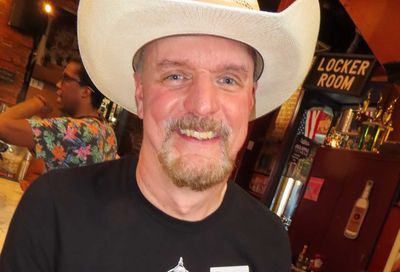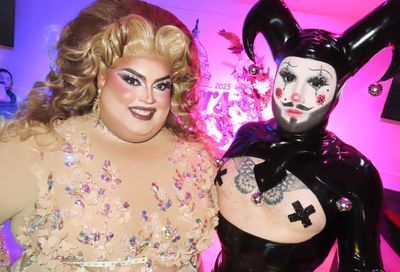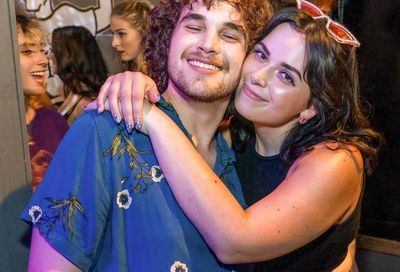Setting the Course
Gay issues fill the edges at Congressional Black Caucus Foundation's national black political conference in D.C.
Boston may have gotten the Democrats, and New York the Republicans, but Washington hosted a major political conference of its own last weekend as the Congressional Black Caucus Foundation, Inc., held its 34th Annual Legislative Conference Sept. 8-11 at the Washington, D.C., Convention Center.
Founded in 1976, the non-partisan CBCF has a mission to “broaden and elevate the influence of African Americans in the political, legislative and public policy arenas.” The conferences feature the biggest names in African-American politics and sociology, from Rep. Maxine Waters (D-Calif.) to activist and musician Chuck D.
Like the other gatherings, the CBCF conference also had to deal with gay issues.
“We are not having bold and unabashed discussions on AIDS,” said Phill Wilson. “The elephant in the room we’re not talking about [is] homophobia. We’re not addressing the issue. Black gay men continue to be left out of the dialogue.”
Wilson is the director of the Los Angeles-based Black AIDS Institute, and has been one of the nation’s preeminent voices HIV/AIDS prevention for more than a decade. He mentioned the “elephant in the room” at a Thursday afternoon forum titled “Sex, Sexuality, Taboos, Myths and Relationships: AIDS and Health in African-Descendant Communities.”
Wilson’s comments were possibly the most direct during the conference when it came to homosexuality or HIV/AIDS.
“Some of the things I’m going to say today may not be very popular,” Wilson told the audience of about 100 people at the Thursday conference. Explaining that he’s almost 50, is living with AIDS and has a bad heart, Wilson asked, “If I can’t say what I want to say at this point in my life, when am I going to be able to say it?”
But that forum was a fairly low-key event, compared to a Friday session: “Black Love II: Dating, Disease and the Down Low.” Before the session began, a line of people stretching the length of one of the new convention center’s cavernous halls waited for entry. A Planned Parenthood table with a basket of condoms welcomed them.
The crowd filled all the chairs — about 170 of them — and still more stood around all corners of the room. Notably, the crowd was about 90 percent women.
“I think that’s to be expected,” Wilson said the day after the forum. “In the black community, women are the keepers of the family. When we talk about the impact of our relationships, that’s particularly going to attract black women. I think the other factor is that the discussion of men on the ‘down low’ is a particularly hot topic. Some people were attracted for that reason.”
Indeed, discussion of the “down low” did stir the audience. The term is used to describe African American men who have intimate relationships with women, but engage in clandestine sexual encounters with men.
With Wilson on Friday’s panel was J.L. King, author of the book, On the Down Low. King told the audience he placed a personal ad before coming to the conference, looking for men on the “down low” to interview. He crafted his ad as an invitation for a sexual rendezvous.
King said he received four responses. Two of the respondents were married, two had girlfriends, he said. “All four were bottoms, or receptive,” he said, to some scattered gasps from the audience.
During questions from the audience, there was a request from a woman for King to offer signs to look for to spot when a male partner is having sex with men. A general response from the panel that women should protect themselves no matter the circumstances led to some moments of disorder.
“These women deserve more!,” a self-identified health care worker said emphatically, through a microphone. She insisted that women should look for chronic hemorrhoids in men as a sign they are engaging in anal sex, among other identifiers.
One of the few men in the audience felt obligated to offer a response, chiding the health care worker for promoting “ignorant ways,” as the moderator demanded order.
“There is a lot of hysteria among heterosexual women [regarding the ‘down low’],” the man said after the event. The 29-year-old, gay political consultant asked that his name not be published. “Being from South Carolina, I know a lot of fundamentalist groups who will send people [to forums] to raise a ruckus. Â… Two people loving each other is not a threat to this country. We’re not the problem in the community.”
That the “down low” topic caused a stir at the conference is frustrating from Wilson’s perspective.
“I absolutely think the way the ‘down low’ discussion is being held is a deadly distraction away from a discussion about fighting HIV/AIDS,” Wilson says. “People know it’s not a black phenomenon. The way it’s characterized is because that’s the way people want to see it. America wants to look at black men as sexual predators. It’s scintillating to America. There’s a deliberate effort to continue the discourse at the level.”
At perhaps the most gay-related event of the weekend, however, there was no discussion of the “down low.” The atmosphere was more casual than at either of Wilson’s sessions, but the discussion never got off track at a breakfast hosted Friday morning by the National Black Justice Coalition. The NBJC, founded last year with the support of the Gill Foundation, the Human Rights Campaign and the National Gay & Lesbian Task Force, describes itself as an ad hoc coalition of black LGBT leaders who collectively fight against discrimination in the African-American community.
“This weekend is so important,” Donna Payne told a gathering of about 25 LGBT leaders over coffee, fruit and bagels Friday morning at the Logan Circle-area Morrison-Clark Inn.
“It’s so important to support the Congressional Black Caucus,” said Payne, explaining that the conservative African-American religious community is influential with the CBC. “They’ve gotten a lot of heat, and they’ve been 100 percent supportive [of the pro-LGBT legislation]. It’s very important that we have their back.”
As evidence of what the NBJC is doing to that end, Payne touted a new ad campaign her group is running in African-American newspapers around the country. The ads implore readers to stand up for equal rights for the gay community in light of efforts to amend the constitution to prohibit same-sex marriages.
“We’re moving here. We’ve got a lot on our plate, but we’re present,” Payne promised. “We’re doing some huge things here. We want to make sure there’s a counter to the ‘religious right.'”
The kind of action Payne talked about is akin to what Wilson, who figures he’s attended about 15 CBCF conferences, says is improving the conferences over time. And as he heads off to South Africa to discuss regional and global organizing efforts with the local LGBT community, Wilson says the conference has left him feeling upbeat.
“I’m leaving on an optimistic note because of what I’ve seen this weekend, and because I’m an optimistic person,” Wilson offers. “Even in the darkest hours, I’m confident black people will survive and thrive. This weekend is more of an affirmation of that.”
Support Metro Weekly’s Journalism
These are challenging times for news organizations. And yet it’s crucial we stay active and provide vital resources and information to both our local readers and the world. So won’t you please take a moment and consider supporting Metro Weekly with a membership? For as little as $5 a month, you can help ensure Metro Weekly magazine and MetroWeekly.com remain free, viable resources as we provide the best, most diverse, culturally-resonant LGBTQ coverage in both the D.C. region and around the world. Memberships come with exclusive perks and discounts, your own personal digital delivery of each week’s magazine (and an archive), access to our Member's Lounge when it launches this fall, and exclusive members-only items like Metro Weekly Membership Mugs and Tote Bags! Check out all our membership levels here and please join us today!




















